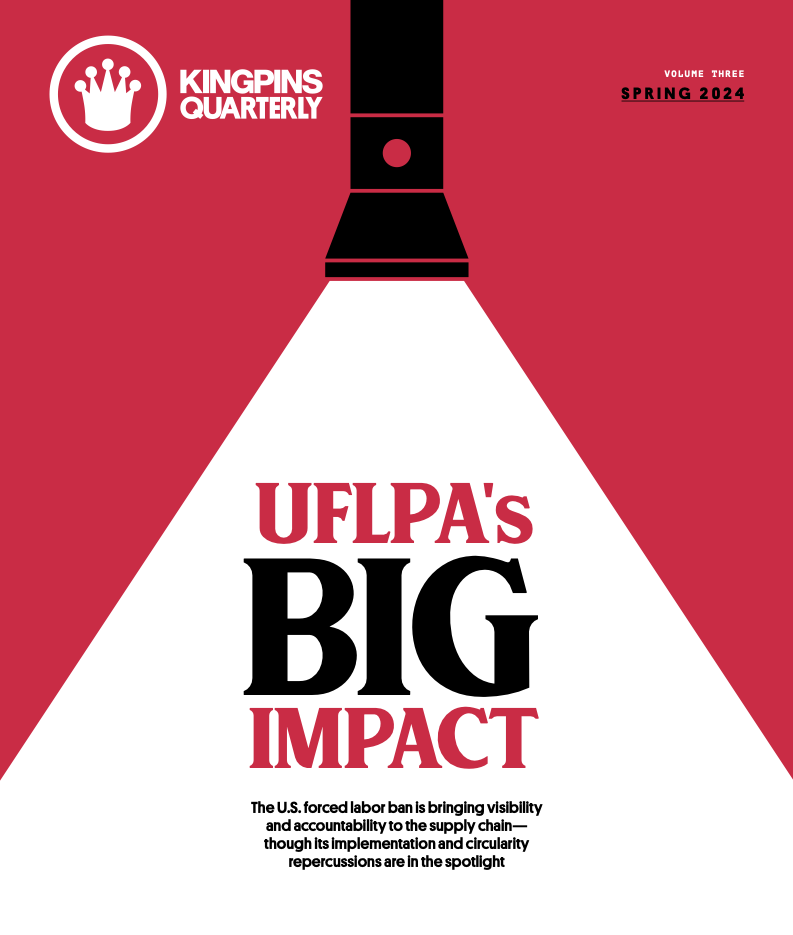Emessa Denim may be a new name in the U.S. market but it is an established partner for better European brands and retailers. High quality standards plus a focus on ESG has made the Egypt-based trouser producer a trusted resource for household names in the EU like MaxMara, Brax, Marco Polo and Camel Active. And now, Emessa Denim is courting partners in the U.S. that have a shared vision and values.
“We are not only a producer. We are a partner for the brands. We understand their market. We understand their demand. We develop projects together in terms of their collection achieving any improvement, whether that’s efficiency, sustainability, new products, new sourcing,” said founder Anis Trabulsi. This partnership relationship is an important distinction that separates Emessa from its competitors in the region. Another is the company’s willingness to be transparent, something Trabulsi said brands are often missing. “If there is a problem, we immediately communicate and we find a solution together.”
Emessa, which focuses on the better to high-end market, operates a 20,000 square meter facility with capacity to produce 2.5 million denim and woven trousers per year. The company’s capabilities span laundry, automatic cutting, finishing, printing, embroidery and sewing. Emessa’s technical department is keenly focused on strong measurement control to alleviate reverse logistics headaches for its partners’ online sales. And its location in Egypt affords it many advantages that sourcing executives in both the EU and U.S. can benefit from. The country’s stable political environment, solid infrastructure, four international ports, good energy supply and large workforce pool make it an ideal production destination. Further, under the Qualifying Industrial Zones (QIZ) initiative, goods from Egypt that contain inputs from Israel enjoy duty-free status in the U.S.
Emessa employs Jeanologia laser technology, nanotechnology and ozone to create on trend washes and finishes that are less impactful to the environment. Emessa’s value chain is 90 percent based in Africa, with more than 80 percent of all fabric, threads and zippers coming from Egypt. The advantages are twofold: a short supply chain and a low carbon footprint.
Emessa believes environmental sustainability is not only table stakes today, but that it should permeate all products and processes. “Sustainability, in our opinion, not only includes water treatment and chemical reduction, it’s also about how many second choice do you do. If you do less second choice, you have less impact to the environment,” Trabulsi said.
This ethos has led to Emessa being regarded as the most sustainable factory in North Africa. It is RCS, GOTS and OCS certified and ISO 9001:2015, ISO 14001:2105 and ISO 45001:2018 compliant.
The company continues to look for new ways to achieve greater sustainability. Emessa’s ultimate goal is to be a water- and chemical-free, low energy factory producing high fashion garments which are comparable with conventionally produced garments in terms of price and fashion level. To that end, it is constantly testing and sampling and evaluating the latest materials and tech innovations to lessen its impact and provide its brand partners with verifiable data they can use in their storytelling with the end consumer.
Improvement also comes through the company’s rigorous training program, which is just one way in which Emessa fosters a supportive environment for its 1,700 person-plus workforce. “Our main focus is on creating a good social environment, giving our workers and their families a good outlook for their future,” Trabulsi said. “They feel loyal to our company and they see that we take care of all of them. There’s respect and everybody is valued.” From line workers through middle management, Emessa offers continuous education to enable them to do their jobs and to reinforce the company culture. Emessa BSCI-certified, which is comparable to WRAP compliance in the U.S., which the company has also applied for.
As Emessa launches into the U.S. market, the company looks forward to forging new relationships with brands that can embrace its environmental and social improvement stance. “Our company culture and partnerships with our clients is paramount. This is what allows Emessa to create responsible, high fashion products that meet the exacting standards of our brands,” Trabulsi said. “We are looking for customers who have the same idea and same vision.”




